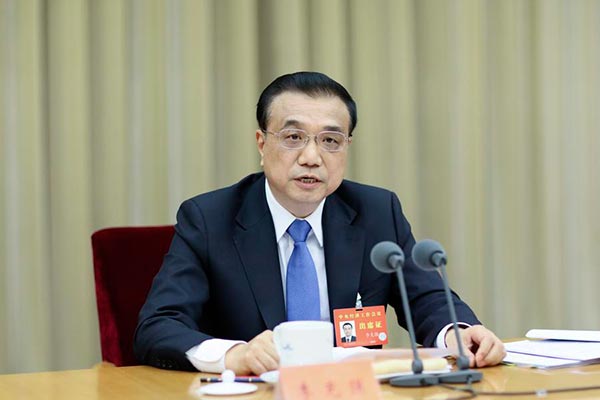

 |
| Chinese Premier Li Keqiang speaks at the Central Urban Work Conference in Beijing, Dec 22, 2015.[Photo/Xinhua] |
Document shows determination to improve governance, says professor
The State Council, China's Cabinet, has called for more transparent governance by 2020 by making more government information public.
In a document issued on Wednesday, governments at all levels were asked to keep the public informed in five main aspects: policymaking policy implementation, managerial affairs, public services and government decisions.
"The document is a new national guideline for the disclosure of government affairs," said Yang Weidong, a law professor at the Chinese Academy of Governance.
Yang said the fourth plenary session of the 18th Communist Party of China Central Committee in October 2014 set the tone for the publication of information and listed what should be made public.
Underscoring that openness and transparency are the basic elements for good governance, the document called for regular information disclosure of government affairs, aiming to build a government featuring the rule of law, innovation, integrity and service orientation.
The document specified when governments should make information public and when to keep it confidential.
Government websites are important platforms to demonstrate administrative capacities and give the public access to official information, according to the document. Thus it's critical to push forward the cooperation of the Internet and governmental services, making websites better serve the public, it said.
Interest groups, members of the public, experts and the media should be invited to attend government policymaking meetings as nonvoting delegates, according to the guideline.
With the participation of people from different walks of life, and especially with the involvement of the media, the decision-making procedures are expected to be more transparent and better serve the interests of the public, Yang said.
The document requires making public three lists: government powers, government responsibilities and the negative list, which identifies sectors and businesses that are off-limits to foreign investment.
Meng Qingguo, a professor of governance at Tsinghua University, said the three lists reflect the central government's determination to improve governance by specifying government authority and obligations.
"It is a great step forward to building a transparent and clean government and in promoting the rule of law," he said.
 2016 Miss Chinatown USA pageant held in San Francisco
2016 Miss Chinatown USA pageant held in San Francisco Ancient pagodas across China
Ancient pagodas across China Beijing Film Academy starts 2016 entrance exam
Beijing Film Academy starts 2016 entrance exam Wedding dress show up in the air
Wedding dress show up in the air Have you ever taken these beautiful subways in China?
Have you ever taken these beautiful subways in China? Russian photographer brings fairytales to life
Russian photographer brings fairytales to life Chinese beauties, foreign models meet in Chengdu
Chinese beauties, foreign models meet in Chengdu Awesome! Aerial pictures taken on J-11 fighter
Awesome! Aerial pictures taken on J-11 fighter A foreign girl explains what China should be proud of
A foreign girl explains what China should be proud of Top 20 hottest women in the world in 2014
Top 20 hottest women in the world in 2014 Top 10 hardest languages to learn
Top 10 hardest languages to learn 10 Chinese female stars with most beautiful faces
10 Chinese female stars with most beautiful faces China’s Top 10 Unique Bridges, Highways and Roads
China’s Top 10 Unique Bridges, Highways and Roads Is ‘I love you’ harder to say in Chinese
Is ‘I love you’ harder to say in Chinese China must prepare for worst in the Korean Peninsula
China must prepare for worst in the Korean Peninsula Exorbitant bride prices drive rural families of sons into crippling debt
Exorbitant bride prices drive rural families of sons into crippling debt E-commerce giant invests in music, movies to buttress its core business
E-commerce giant invests in music, movies to buttress its core businessDay|Week